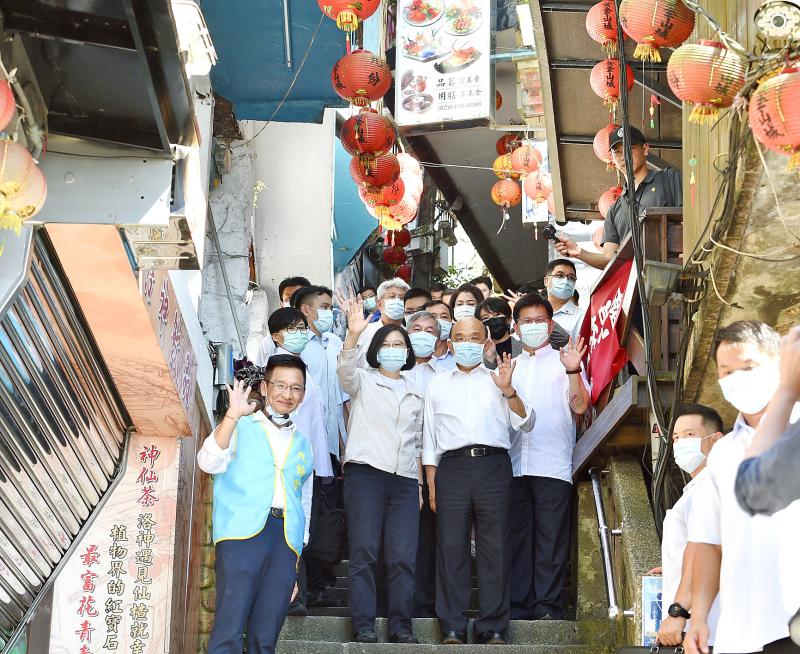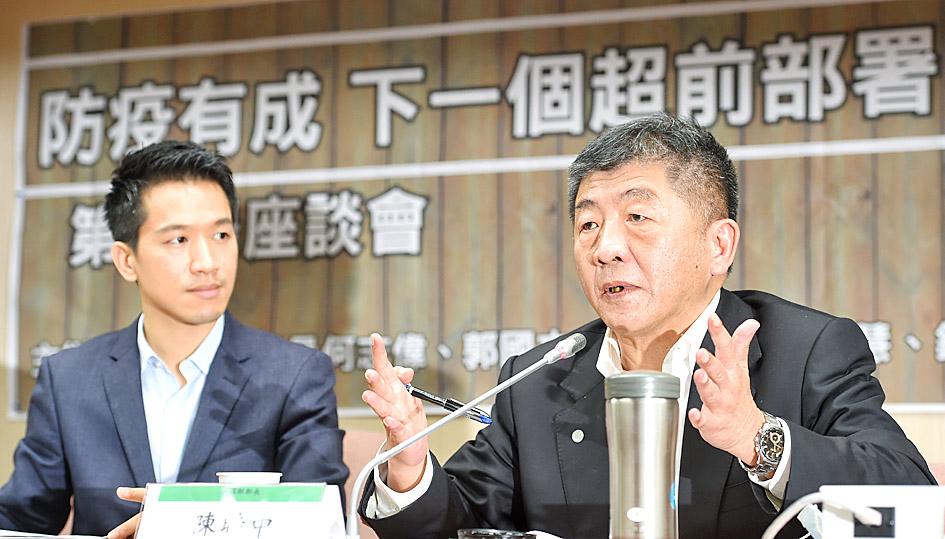The government is to adopt different disease prevention measures to regulate the entry of business travelers and international tourists once the borders are reopened, Minister of Health and Welfare Chen Shih-chung (陳時中) said yesterday.
Chen, who heads the Central Epidemic Command Center (CECC), was speaking at a seminar hosted by Democratic Progressive Party Legislator Mark Ho (何志偉).
The center is considering shortening the quarantine time for business travelers — including trade, technology and healthcare professionals — from 14 days to between five and 10 days, Chen said.

Photo courtesy of the Presidential Office Press Club
Before business travelers are allowed to enter the nation, they must present immigration officials with a polymerase chain reaction screening certificate showing that they tested negative for COVID-19 before arrival, Chen said.
To regulate the activities of business travelers within the nation, Chen said that local sponsors must ensure that their guests make reservations at certified disease prevention hotels in advance.
They must present a disease prevention plan stating whether their guests would travel to specific locations or engage in restricted activities in non-specific locations, he said, adding that the plan should also list transportation arrangements the sponsors make for their guests.

Photo: Liu Hsin-de, Taipei Times
“While they are in quarantine, business travelers can meet with their local sponsors or contacts at the disease prevention hotels at which they are staying, provided the meetings proceed with proper protection for all the participants. After fulfilling their quarantine requirements, they can then go out and visit factories or other sites they need to see during their trip,” Chen said. “These measures would ensure that all the people they come in contact with are traceable in case they are infected.”
Meanwhile, officials from the Centers for Disease Control (CDC) would help trade show organizers devise disease prevention plans so that participants from overseas and locals can remain separated.
“We are really hesitant about reopening our borders to international tourists, as they will not enjoy their trips ... if they can only visit specific locations or come in contact with specific people,” he said.
“However, we are not giving up,” Chen said. “In general, we are leaning toward reopening borders to certain countries or territories under the principle of reciprocity and mutual authentication.”
Chen said the WHO has listed the COVID-19 outbreak in Beijing as a major public health event, but it would have a minimal effect on Taiwan, as the nation has its own border control policies to contain the pandemic.
However, the outbreak could further postpone the reopening of the borders to Chinese tourists, he added.
Separately, Minister of Transportation and Communications Lin Chia-lung (林佳龍) said that the government would divide countries into different categories based on their pandemic situation. His ministry would be fully prepared as the nation gradually relaxes border controls, he added.
In addition to China, countries such as Japan and South Korea have reported an increase in COVID-19 cases after they ended lockdowns, Lin said.
The government would take these situations into account when it determines how borders should be reopened, he added.
The CECC is scheduled to unveil details of its plan for easing border controls today.
In related news, the CECC said that it had received tip-offs claiming that the married couple who tested positive for COVID-19 after returning to Taiwan from Bangladesh on Saturday did not wear protective clothing and frequently coughed during the flight.
CDC Deputy Director-General Chuang Jen-hsiang (莊人祥), the CECC’s spokesperson, yesterday said that surveillance footage at the airport showed that the couple only wore masks and not protective clothing.
The CECC would clarify the situation with the local health department, Chuang added.
If the couple made false health declarations, they could face fines of NT$60,000 to NT$300,000 for breaching the Communicable Disease Control Act (傳染病防治法), he said.
Additional reporting by Lee I-chia

‘DANGEROUS GAME’: Legislative Yuan budget cuts have already become a point of discussion for Democrats and Republicans in Washington, Elbridge Colby said Taiwan’s fall to China “would be a disaster for American interests” and Taipei must raise defense spending to deter Beijing, US President Donald Trump’s pick to lead Pentagon policy, Elbridge Colby, said on Tuesday during his US Senate confirmation hearing. The nominee for US undersecretary of defense for policy told the Armed Services Committee that Washington needs to motivate Taiwan to avoid a conflict with China and that he is “profoundly disturbed” about its perceived reluctance to raise defense spending closer to 10 percent of GDP. Colby, a China hawk who also served in the Pentagon in Trump’s first team,

SEPARATE: The MAC rebutted Beijing’s claim that Taiwan is China’s province, asserting that UN Resolution 2758 neither mentions Taiwan nor grants the PRC authority over it The “status quo” of democratic Taiwan and autocratic China not belonging to each other has long been recognized by the international community, the Mainland Affairs Council (MAC) said yesterday in its rebuttal of Beijing’s claim that Taiwan can only be represented in the UN as “Taiwan, Province of China.” Chinese Minister of Foreign Affairs Wang Yi (王毅) yesterday at a news conference of the third session at the 14th National People’s Congress said that Taiwan can only be referred to as “Taiwan, Province of China” at the UN. Taiwan is an inseparable part of Chinese territory, which is not only history but

CROSSED A LINE: While entertainers working in China have made pro-China statements before, this time it seriously affected the nation’s security and interests, a source said The Mainland Affairs Council (MAC) late on Saturday night condemned the comments of Taiwanese entertainers who reposted Chinese statements denigrating Taiwan’s sovereignty. The nation’s cross-strait affairs authority issued the statement after several Taiwanese entertainers, including Patty Hou (侯佩岑), Ouyang Nana (歐陽娜娜) and Michelle Chen (陳妍希), on Friday and Saturday shared on their respective Sina Weibo (微博) accounts a post by state broadcaster China Central Television. The post showed an image of a map of Taiwan along with the five stars of the Chinese flag, and the message: “Taiwan is never a country. It never was and never will be.” The post followed remarks

INVESTMENT WATCH: The US activity would not affect the firm’s investment in Taiwan, where 11 production lines would likely be completed this year, C.C. Wei said Investments by Taiwan Semiconductor Manufacturing Co (TSMC, 台積電) in the US should not be a cause for concern, but rather seen as the moment that the company and Taiwan stepped into the global spotlight, President William Lai (賴清德) told a news conference at the Presidential Office in Taipei yesterday alongside TSMC chairman and chief executive officer C.C. Wei (魏哲家). Wei and US President Donald Trump in Washington on Monday announced plans to invest US$100 billion in the US to build three advanced foundries, two packaging plants, and a research and development center, after Trump threatened to slap tariffs on chips made